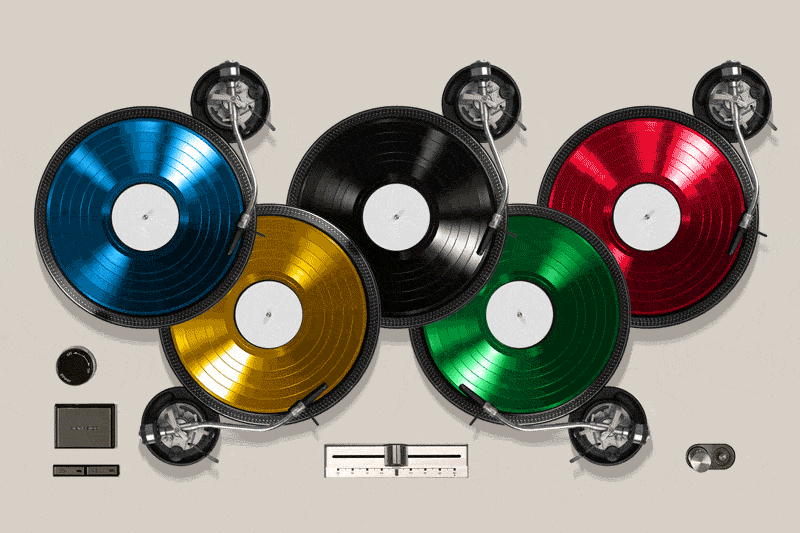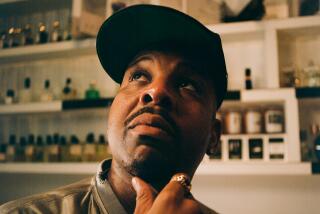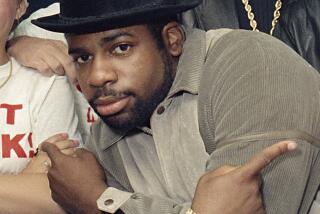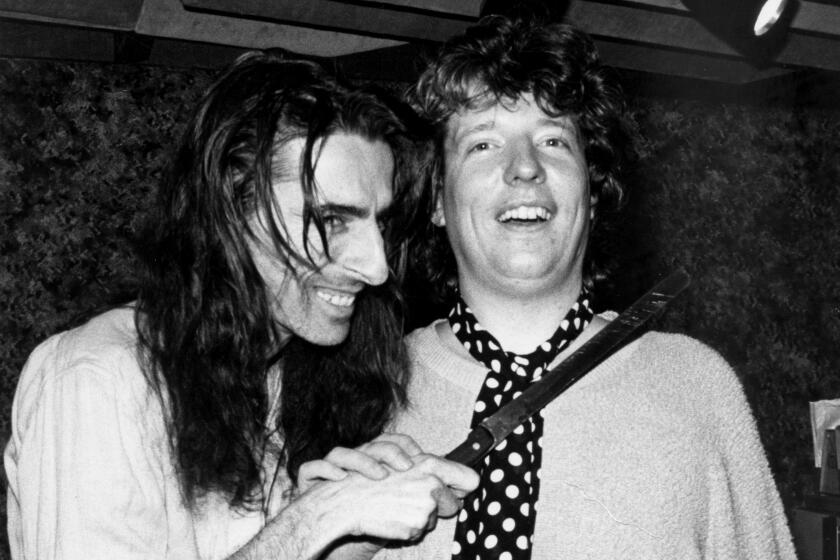A master’s degree in record scratching
- Share via
NEW YORK — Run-DMC was among the first rappers to proclaim that a DJ could be the band. The man behind their beats, Jam Master Jay, was among the first to say that a disc jockey should be a teacher too.
In June 2002, Jay and two partners founded the Scratch DJ Academy to formally teach others the tricks of the turntable -- an education that previously relied almost entirely on word of mouth and sheer repetition.
“Jay would say, ‘If I had this when I was growing up, I’d be that much better,’ ” Scratch DJ Academy President Rob Principe said over the cacophony of 20 aspiring DJs scratching during a recent class.
“And it’s true,” Principe said. “If you approach it without a real understanding of the basics, it’s just going to take that much longer to learn.”
In the early days of Run-DMC, Jay introduced the mainstream to rap’s basic principle: beat. Their debut album consisted of no more than Jay scratching out percussive counterpoint over primitive, tinny beats made by some of the earliest drum machines.
Later, Jay and Def Jam Records producer Rick Rubin layered samples of other instruments over the beat, creating a more complex tableau. And as rap achieved more commercial success, other groups -- following Run-DMC’s lead -- created increasingly complex structures.
Now DJs pop up anywhere, from heavy metal bands to television commercials to nightclubs. The form has transcended genre, Principe said.
“We don’t try to teach in any genre,” he said. “We teach them how to paint and leave it up to them what to do with it. This is not about rap; this is not about hip-hop; this is not about house music; it’s about learning an instrument.”
Stephen Webber, a professor at the Berklee College of Music in Boston, believes DJ-ing is moving toward widespread musical acceptance, much like jazz overcame its rejection as unstructured folk music and rock its dismissal as amplified noise.
“We have crossed a threshold,” Webber said. “It’s just starting to make the transition, much like jazz once did, into a legitimate part of the conservatory curriculum.”
Principe says the school’s creation was a way to legitimize the art.
“It’s time that this art form got the same kind of respect and legitimacy that jazz or rock has gotten,” he said.
Student Norris Baker, 24, who drives once a week from Washington, D.C., for class, echoed that belief.
“Our parents think scratching is just noise,” Baker said. “But now more people acknowledge it as a musical instrument, and with classes like this, I think it’s going to go to the next level.”
Classes at Scratch are like those at any other ensemble workshop.
Students watch as guest teachers demonstrate DJ techniques such as beat matching, mixing and scratching. A recent guest: DJ Premier, who has produced tracks for hip-hop artists from Gang Starr to Fat Joe.
The students then try their hands at it, while the instructor strolls from turntable to turntable, correcting their mistakes.
Classes are held at the beginner, intermediate and advanced levels. The cost is $300 for a 70-minute class every Saturday for six weeks.
Evil Dee, of the DJ crew Da Beatminerz, told students recently: “If you can think about it, you can do it.”
But Berklee’s Webber, who is trying to establish a program at the progressive music conservatory, says creating a curriculum requires much more formality.
“There really are some issues that we’re trying to sort out,” he said. “If someone is going to major in this, the questions arise: ‘What is their musical background, and how do we bring them up to speed?’ ”
In the meantime, Principe has big dreams.
“My goal with this is certainly horizontal expansion -- opening Scratch DJ Miami, Scratch L.A. -- but even more so with vertical expansion, like summer camps, cruise ships, even Club Med,” he said.
Principe said he realizes the school’s commercial potential.
“I see a tremendous market that is unconsolidated and uncoordinated, but that is almost ubiquitous in our culture,” he said.
Sadly, Jam Master Jay -- born Jason Mizell -- won’t get to see where the school will go. He was killed last October at a Queens recording studio in a still-unsolved shooting.
More to Read
The biggest entertainment stories
Get our big stories about Hollywood, film, television, music, arts, culture and more right in your inbox as soon as they publish.
You may occasionally receive promotional content from the Los Angeles Times.










